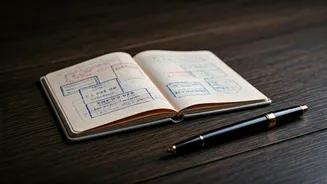Never Lose Sight
First and foremost, keep your passport safe at all times. Think of it as your most important travel document, and treat it with the utmost care. Never
let it out of your sight. This means keeping it in a secure place, like a money belt or a secure pocket in your bag. Avoid leaving it unattended in hotel rooms or public places. Keep it on your person. Should it be stolen or lost, your trip could face significant disruptions. Reporting a lost or stolen passport immediately to the relevant authorities is essential to prevent misuse.
Avoid Unauthorized Handling
Be cautious about who you hand your passport to. Only give it to authorized personnel, like airline staff or immigration officers. Be wary of strangers asking to see it, and always double-check the credentials of anyone requesting to handle your passport. When in doubt, it is wise to decline and inquire with the relevant authority. Keep a digital or physical copy of your passport separate from the original. This is a crucial safety measure; should the original document be lost or stolen, you will have the necessary information to file a report and obtain a replacement.
Passport Storage is Key
Store your passport in a safe and dry place when you are not traveling. Excessive heat, moisture, and direct sunlight can damage the document, making it unreadable. Consider a passport holder or a protective sleeve to shield it from wear and tear. Store it separately from other documents that could potentially damage it. Keep it in a secure place, ideally with other essential documents, in case you need them. Remember, a damaged passport may not be accepted at border control, which could lead to complications.
Never Use as Collateral
Never use your passport as collateral for anything. This practice, unfortunately, continues to occur. Your passport is a crucial identification document. It is not an item to be pawned or left as security. Refusing to surrender your passport ensures that you retain control over your identification and prevents potential misuse. Furthermore, it might not be a valid transaction. This may violate legal and international standards. A passport is to be protected. Keeping your passport for your exclusive use is always best.
No Alterations Permitted
Refrain from making any alterations to your passport. This includes changing any details, adding stickers, or writing on it. Any such alteration can render your passport invalid. It can lead to you being denied entry into countries. Keep it in its original form, as issued by the government. The slightest modification can raise suspicion with border control. They may interpret it as an attempt to tamper with the document. A pristine passport is always the best way to ensure smooth travel.
Expiry Dates Matter
Always check your passport's expiration date. Many countries require your passport to be valid for at least six months after your planned return date. This is a common rule, and ignoring it can result in denied entry. Renew your passport well in advance of your travel plans. Don't wait until the last minute. This allows enough time for processing, which can sometimes be delayed. Ensure your passport remains valid throughout your entire trip. Checking the expiry date is a fundamental step in travel preparation.
Don’t Overpack Passport
Don't overpack your passport with unnecessary items. Avoid storing credit cards, cash, or other documents inside your passport. The added bulk can damage the document and make it more difficult to handle. Keep your passport separate from other essential documents. Have a designated place for it. Consider using a passport wallet or a travel organizer to keep it safe. By separating it from other items, you can minimize the risk of damage or loss, ensuring your passport stays in good condition.
Report Immediately
If your passport is lost or stolen, report it immediately to the local authorities. Additionally, inform your embassy or consulate. This is a crucial step in preventing identity theft and misuse of your passport. Provide all the relevant details about when and where it was lost or stolen. The embassy or consulate can issue a replacement passport and assist you with other necessary procedures. Timely reporting is essential to mitigating the potential consequences of passport theft or loss. The faster you act, the safer you are.













